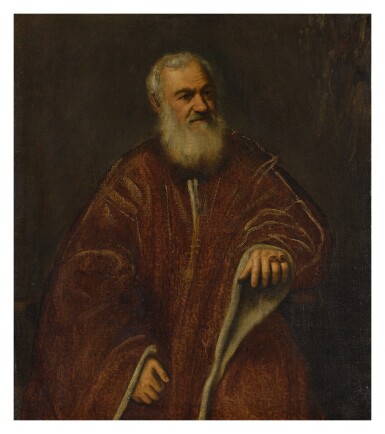
Property Sold to Benefit the Acquisition Fund of the San Diego Museum of Art
ATTRIBUTED TO JACOPO ROBUSTI, CALLED JACOPO TINTORETTO AND WORKSHOP | PORTRAIT OF A VENETIAN SENATOR
Lot Closed
June 11, 02:11 PM GMT
Estimate
10,000 - 15,000 USD
Lot Details
Description
Property Sold to Benefit the Acquisition Fund of the San Diego Museum of Art
ATTRIBUTED TO JACOPO ROBUSTI, CALLED JACOPO TINTORETTO AND WORKSHOP
Venice 1518 - 1594
PORTRAIT OF A VENETIAN SENATOR
oil on canvas
canvas: 42½ by 37¼ in.; 108 by 94.6 cm.
framed: 57½ by 52 in.; 144.8 by 132.1 cm.
Count Melzi d’Eril;
Marchese Zaccaria, Milan;
With Jacob M. Heimann, New York, by 1940;
Anne R. and Amy Putnam, San Diego;
By whom gifted to the Fine Arts Gallery, San Diego, 1950 (inv. no. 1950.113).
New York, Corona Park, World's Fair, 1939-1940;
Toledo, Toledo Museum of Art, Four Centuries of Venetian Painting, 1940, no. 59 (as a portrait of Tommaso Rangone).
Masterpieces of art, European paintings: from the New York World's Fair and the Golden Gate International Exposition,
Masterpieces of Art From the European and American Collections, Detroit 1941, p. 16;
A. Millier, “San Diego Re-opens Fine Art Academy in Beautiful Balboa Park,” in Art Digest, vol. 22.7, 1 January 1948, p. 9;
J.D. Morse, Old Masters in America, New York 1955, p. 160;
The Fine Arts Gallery of San Diego Catalogue, San Diego 1960, p. 69;
B.B. Fredericksen, Census of Pre-Nineteenth Century Italian Paintings, Cambridge 1972, pp. 201, 520, 632 (as follower of Jacopo Tintoretto);
J. Marciari, Italian, Spanish, and French Paintings before 1850 in the San Diego Museum of Art, San Diego 2015, pp. 187-189, cat. no. 37, reproduced (dated circa 1577, as a late workshop follower of Tintoretto).
By the early 1550s Tintoretto had refined his vocabulary as a portraitist and in 1551 he had replaced Titian as official portraitist to the Venetian Republic. His social connections, the quality of his work and above all his speed of execution secured him this position. Although the mounting pressures of commissions would inevitably diminish his own participation in many later works, Tintoretto's abilities as a portraitist were greatly admired by his contemporaries. Cristoforo Sorte, writing in his Ossservationi nella pittura in 1580, praised his 'perfettissimo giudicio nei ritratti' (most perfect judgement in portraits) and in his Trattato dell'arte della pittura of 1584 Gian Paolo Lomazzo refers to him as 'ritrattista d'eterna fama' (a portraitist of eternal fame).
In the present portrait, the expert and lively representation of sitter's face, with its beautifully molded contours and well-constructed features suggests it to be the work of Tintoretto himself. Like numerous portraits by the artist from this time period, the lower section was likely completed by an assistant in his studio.
It has been suggested that this portrait is of the famous Venetian physician and arts patron Tommaso Rangone (1493-1577), whose bronze portrait prominently adorns the church of San Zulian, near the Piazza San Marco.
